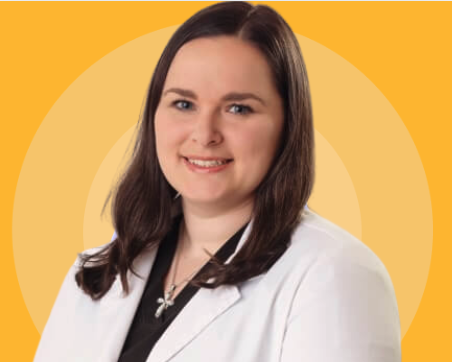
Stephanie Hill, DVM
Veterinarian


We’re proud to spotlight this month’s TopDoc Award recipient, Dr. Stephanie Hill, whose lifelong love of animals shaped a career dedicated to patient care, mentorship, and compassionate client relationships.
From problem-solving in complex cases to supporting her team and teaching future veterinarians, Dr. Hill brings both skill and empathy to her work at Swann Animal Clinic in Amarillo, Texas. As part of this recognition, Dr. Hill has selected Hope Lives Here as the recipient of a donation from HappyDoc.
We spoke with Dr. Hill about her journey in veterinary medicine, the lessons she’s learned, and the impact she hopes to make on both pets and people.
Can you tell us about your path to becoming a veterinarian? When did you know you wanted to be a vet? Why?
I think I have always wanted to work with animals. I remember going to Sea World when I was probably four or five and becoming obsessed with marine life. I also remember a family trip where I sat out on the stairs of our motel playing with some stray kittens.
When I got older, around sixth grade, someone asked me if I was going to be a veterinarian since I loved animals. I decided that, yes, that was what I wanted to do, and I never grew out of it.
I have a degree in Agriculture/Animal Science from West Texas A&M University (Go Buffs!) and my DVM from Texas A&M University (Thanks and Gig ’em!). I am currently a small animal general practitioner at Swann Animal Clinic in Amarillo, Texas.
What do you enjoy most about your day-to-day work as a veterinarian?
I feel the most fulfilled when I find out I was able to help resolve a problem. The diarrhea is better? Great! He’s not limping anymore? Perfect! Diabetes symptoms are controlled, and insulin therapy is not as scary as you thought? I’m so glad to hear that!
I also love working with the doctors, administrators, and technical staff we have — that always makes my day better.
How has your role evolved over the years?
I’m a little over four years out of school as a small animal general practitioner, but things have already changed quite a bit for me. I stopped doing surgeries about a year ago to focus more on internal medicine-type cases because I’m pretty good at it.
Our clinic also hosts 4th-year veterinary students from the Texas Tech University School of Veterinary Medicine, and I have the opportunity to teach them while they are here, which I have really enjoyed.
How do you feel you make the biggest impact on your patients and their families?
I make an effort to build trust with my clients and patients.
I use a lot of Fear Free and Cat Friendly techniques to keep my patients comfortable, and I do my best to listen and give options when possible so care can be customized to each pet and family.
What separates good vets from great vets?
I asked my technical staff this question, and they said “complicated diabetics.”
I think what makes the difference is that great vets are constantly trying to learn, gain knowledge and skills, and continue to care even when exhausted.
What advice would you give to someone considering a career in veterinary medicine?
Have a good support system in place. A lot of days I come home tired, with medical notes still to finalize and case details still swirling in my brain. I am so thankful to have my husband to hug, eat with, and talk to.
In this career, I have had days that are so fulfilling and days that are so crushing — and either way, it’s important to have someone to share it all with.
Are there any misconceptions about veterinary care that you wish more people understood?
Sometimes, I have clients or patients wait on me longer than I’d like, and they get frustrated. I try to honor everyone’s time, but I also try to honor every patient’s needs, and sometimes that takes longer than I expect.
I’m doing my best, but I understand it can come across as unprofessional when I am late getting into the next appointment.
If you weren’t a veterinarian, what do you think you’d be doing instead?
My dad and my grandpa both held pilot’s licenses at one time. I think I might have considered becoming a commercial pilot.
Why did you choose the organization that you chose for HappyDoc’s donation?
I picked Hope Lives Here. Their mission is to pair shelter dogs with veterans with PTSD, traumatic brain injuries, etc., and train them to support each other.
I like the idea of being able to help change human lives and canine lives at the same time. My uncle and both grandfathers served in various branches of the military, and all of my dogs have been shelter kids, so I feel pride in this organization.
Congratulations to Dr. Stephanie Hill — and thank you for the care, compassion, and impact you bring to your patients, their families, and your community!


